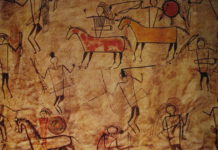Photo Credit: Global Diaspora News (www.GlobalDiasporaNews.com).
Accurate representation of the religious Jewish community is more important now more than ever amid a record surge in antisemitism since Hamas’ Oct. 7 massacre across southern Israel, according to the author of a new fiction novel about an Orthodox Jewish man who discovers in middle age that he is not Jewish.
“Accuracy is so important to me,” Goyhood author Reuven Fenton told The Algemeiner. “People assume that the ultra-Orthodox Jewish community is the Jewish version of the Taliban and that’s not true at all.”
“Whenever you see anything media-oriented that has to do with Orthodox Jews, if you’re part of that world in any way, you look at it and roll your eyes because they never get it right. It’s full of flaws, exaggerations, and misinformation,” added the first-time author, who is also the only Orthodox Jewish reporter on staff for the New York Post. “I felt it was my obligation, [and] that the least I could do in writing this novel was to get everything on the money.”
Goyhood revolves around the story of Mayer, who formerly went by “Marty” before becoming religious. Mayer fled his small town in Georgia for Brooklyn, New York. He is now a devout yeshiva-learning kollel man who is married to the daughter of a well-respected rabbi and has not left the confines of the ultra-religious Jewish community in years. His twin brother, David, is not religious at all and lives a hedonistic lifestyle, constantly pursuing pleasures such as women and cars. The brothers are middle-aged and after their mother dies, they find out they’re not in fact Jewish at all.
Mayer’s only solution is to convert to Judaism, but the earliest appointment he can get to finalize the conversion is days away. In the meantime, the estranged brothers decide to embark on a road trip together, along with their mother’s ashes. Along the way they pick up two tagalongs: an Instagram influencer named Charlayne Valentine and Popeye, a one-eyed dog. During the course of their trip, the twin brothers face a number of situations and make revelations about themselves and their relationships with God. They come to terms with how spirituality and religion plays a role in their lives.
Goyhood is described in the novel as “the state of rebounding from one travesty to the next.”
“Mayer’s big realization has to do with ‘I may not have been living my life a proper way because essentially I have been living this ultra-cloistered life,’” Fenton explained. “During the book, he comes to understand that there are other ways to be a Jew than to be one who spends the entirety of his waking time in a yeshiva. That there’s a virtue in participating in the world and being involved with people and contributing to the world, and not simply thinking yourself for the purpose of collecting schar [merit] that you can redeem in the afterlife. That life is meant to be lived here on earth and he lives that life in the course of three days. He does some major living in a very short amount of time and comes out a different person.”
The author added, “While Mayer ends up loosening up and being more into participating with the world, David actually wants to go the opposite route and be more introspective and learned, spiritual and explore the deeper kind of cerebral things in life.”
Fenton told The Algemeiner that the brothers represent “a duality of one person” and depict two “dueling sides” of Fenton himself — one secular and one religious. Growing up, Fenton’s family was traditional but not particularly religious. When he was around 12 years old, they abruptly adopted an Orthodox religious lifestyle.
Fenton had a secular audience in mind when writing Goyhood and said that’s why he was so focused on giving readers an “authentic experience” when it came to his depiction of Orthodox Jews. He even showed the finished manuscript for Goyhood to his brother, a rabbi, to get a “seal of approval” and make sure the book correctly portrays all aspects of the Orthodox Jewish lifestyle.
“I just think that there’s just a lot of ignorance about the [Orthodox] Jewish people, how they function,” the author said, adding that even at work, “most of my colleagues are not as familiar with the Orthodox world as I am and I’m constantly correcting misperceptions.”
The Anti-Defamation League (ADL) reported last month that it recorded a total of 8,873 antisemitic incidents in the United States in 2023, marking a 140 percent increase from the prior year and the highest level ever recorded by the civil rights organization since it began tracking antisemitic activity in 1979. The majority of the incidents, 5,204, occurred in the last quarter of the year, following the Hamas atrocities of Oct. 7, when the Palestinian terrorist group invaded southern Israel, murdered 1,200 people, and kidnapped 253 others as hostages.
Fenton said it’s hard for a Jewish author to push for their work to get published, especially if it has Jewish themes, while Jews around the US are facing an uptick in antisemitic incidents. He explained that authors who also express solidarity with Israel are being targeted by the “TikTok mob” of anti-Israel activists, who “review bomb” books on websites, such as GoodReads, and bring a novel’s rating down by giving it one-star reviews “on mass.”
“If you so much as mention the word ‘Israel,’ you’re really screwed,” he added.
Nevertheless, Fenton insisted it’s extremely important following the Oct. 7 attacks to share any Jewish-related content and show solidarity with the Jewish community. For that reason, he was determined to wear a Jewish skullcap, also known as a kippah, in the author photo included in Goyhood. The picture was taken after the Oct. 7 attacks, and Fenton said that although he is normally self-conscious about displaying his Judaism, when it came to taking the photo, “because of Oct. 7, I wanted to wear my Judaism proudly.”
He added, “Jews are being silenced right now. Jews are afraid to walk around in public and express Judaism openly. More than ever, right now is the time to say, ‘I’m a Jew. I’m a proud Jew [and] I’m proud to be supportive of Israel as the Jewish homeland.’ Just to announce yourself as a Jew right now is very important.”
“Any kind of exclamation of Judaism right now is important,” he concluded.
Goyhood will be released on May 28 but is available for pre-order now.
Source of original article: Culture – Algemeiner.com (www.algemeiner.com).
The content of this article does not necessarily reflect the views or opinion of Global Diaspora News (www.GlobalDiasporaNews.com).
To submit your press release: (https://www.GlobalDiasporaNews.com/pr).
To advertise on Global Diaspora News: (www.GlobalDiasporaNews.com/ads).
Sign up to Global Diaspora News newsletter (https://www.GlobalDiasporaNews.com/newsletter/) to start receiving updates and opportunities directly in your email inbox for free.































